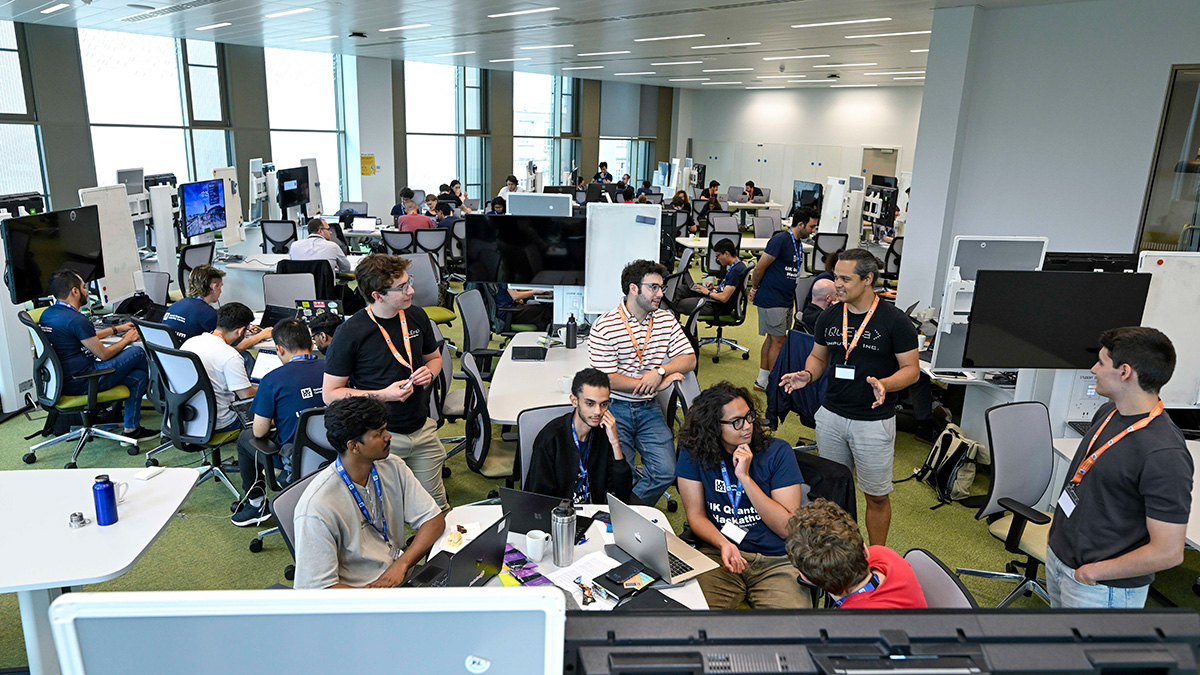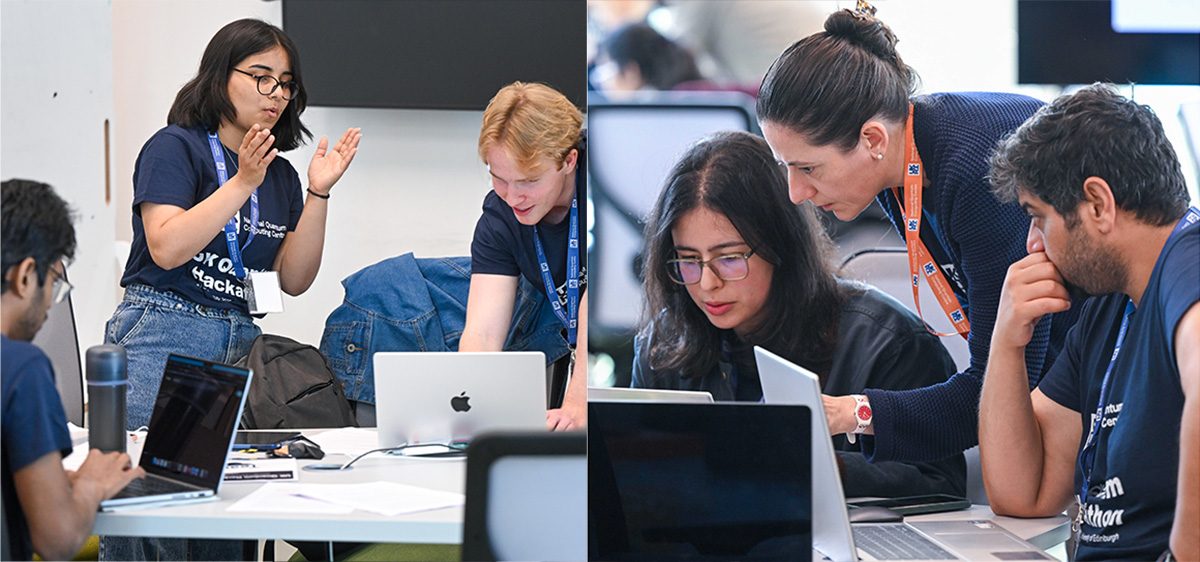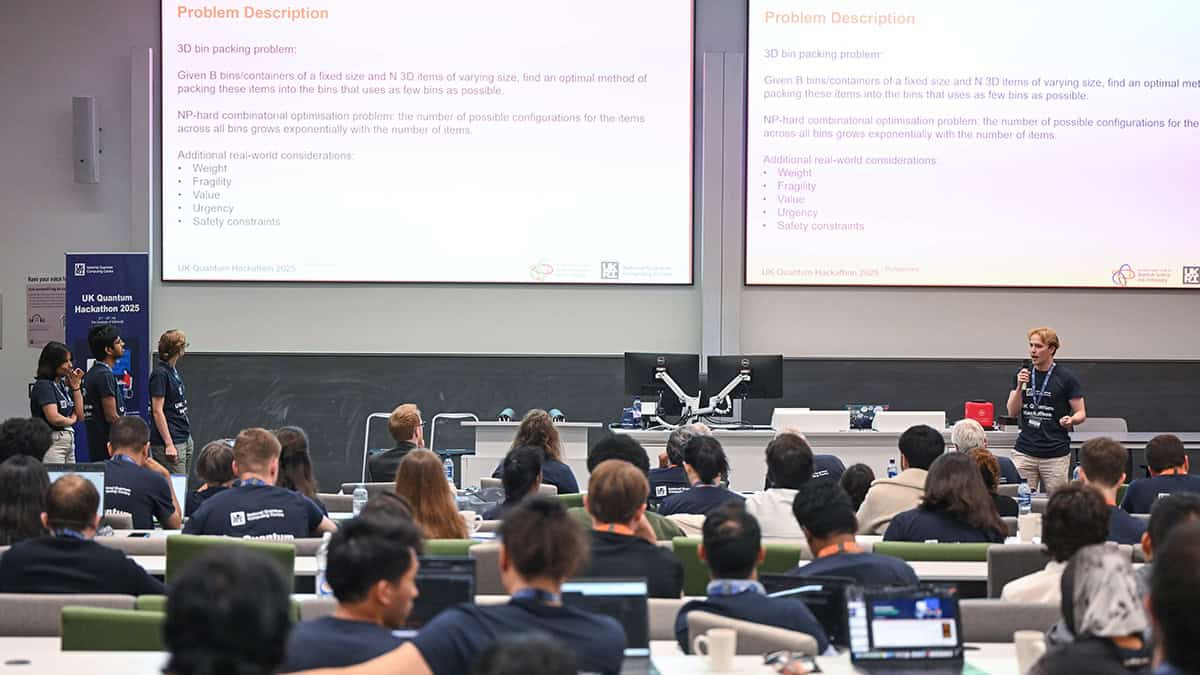
The International Year of Quantum Science and Technology (IYQ) has already triggered an explosion of activities around the world to mark 100 years since the emergence of quantum mechanics. In the UK, the UNESCO-backed celebrations have provided the perfect impetus for the University of Edinburgh’s Quantum Software Lab (QSL) to work with the National Quantum Computing Centre (NQCC) to organize and host a festival of events that have enabled diverse communities to explore the transformative power of quantum computing.
Known collectively as the Quantum Fringe, in a clear nod to Edinburgh’s famous cultural festival, some 16 separate events have been held across Scotland throughout June and July. Designed to make quantum technologies more accessible and more relevant to the outside world, the programme combined education and outreach with scientific meetings and knowledge exchange.
The Quantum Fringe programme evolved from several regular fixtures in the quantum calendar. One of these cornerstones was the NQCC’s flagship event, the UK Quantum Hackathon, which is now in its fourth consecutive year. In common with previous editions, the 2025 event challenged teams of hackers to devise quantum solutions to real-world use cases set by mentors from different industry sectors. The teams were supported throughout the three-day event by the industry mentors, as well as by technical experts from providers of various quantum resources.

This year, perhaps buoyed by the success of previous editions, there was a significant uptick in the number of use cases submitted by end-user organizations. “We had twice as many applications as we could accommodate, and over half of the use cases we selected came from newcomers to the event,” said Abby Casey, Quantum Readiness Delivery Lead at the NQCC. “That level of interest suggests that there is a real appetite among the end-user community for understanding how quantum computing could be used in their organizations.”
Reflecting the broader agenda of the IYQ, this year the NQCC particularly encouraged use cases that offered some form of societal benefit, and many of the 15 that were selected aimed to align with the UN’s Sustainable Development Goals. One team investigated the accuracy of quantum-powered neural networks for predicting the progression of a tumour, while another sought to optimize the performance of graphene-based catalysts for fuel cells. Moonbility, a start-up firm developing digital twins to optimize the usage of transport and infrastructure, challenged its team to develop a navigation system capable of mapping out routes for people with specific mobility requirements, such as step-free access or calmer environments for those with anxiety disorders.
During the event the hackers were given just two days to explore the use case, formulate a solution, and generate results using quantum simulators, annealers and physical processors. The last day provided an opportunity for the teams to share their findings with their peers and a five-strong judging panel that was chaired by Sir Peter Knight, one of the architects of the UK’s National Quantum Technologies Programme and co-chair of the IYQ’s Steering Committee a prime mover in the IYQ celebrations. “Your effort, energy and passion have been quite extraordinary,” commented Sir Peter at the end of the event. “It’s truly impressive to see what you have achieved in just two days.”
From the presentations it was clear that some of the teams had adapted their solution to reflect the physical constraints of the hardware platform they had been allocated. Those explorations were facilitated by the increased participation of mentors from hardware developers, including QuEra and Pasqal for cold-atom architectures, and Rigetti and IBM for gate-based superconducting processors. “Cold atoms offer greater connectivity than superconducting platforms, which may make them more suited to solving particular types of problems,” said Gerard Milburn of the University of Sussex, who has recently become a Quantum Fellow at the NQCC.

The winning team, which had been challenged by Aioi R&D Lab to develop a quantum-powered solution for scheduling road maintenance, won particular praise for framing the problem in a way that recognized the needs of all road users, not just motorists. “It was really interesting that they thought about the societal value right at the start, and then used those ethical considerations to inform the way they approached the problem,” said Knight.
The wider impact of the hackathon is clear to see, with the event providing a short, intense and collaborative learning experience for early-career researchers, technology providers, and both small start-up companies and large multinationals. This year, however, the hackathon also provided the finale to the Quantum Fringe, which was the brainchild of Elham Kashefi and her team at the QSL. Taking inspiration from the better-known Edinburgh Fringe, the idea was to create a diverse programme of events to engage and inspire different audiences with the latest ideas in quantum computing.
“We wanted to celebrate the International Year of Quantum in a unique way,” said Mina Doosti, one of the QSL’s lead researchers. “We had lots of very different events, many of which we hadn’t foreseen at the start. It was very refreshing, and we had a lot of fun.”
One of Doosti’s favourite events was a two-day summer school designed for senior high-school students. As well as introducing the students to the concepts of quantum computing, the QSL researchers challenged them to write some code that could be run on IBM’s free-to-access quantum computer. “The organizers and lecturers from the QSL worked hard to develop material that would make sense to the students, and the attendees really grabbed the opportunity to come and learn,” Doosti explained. “From the questions they were asking and the way they tackled the games and challenges, we could see that they were interested and that they had learnt something.”
From the outset the QSL team were also keen for the Quantum Fringe to become a focal point for quantum-inspired activities that were being planned by other organizations. Starting from a baseline of four pillar events that had been organized by the NQCC and the QSL in previous years, the programme eventually swelled to 16 separate gatherings with different aims and outcomes. That included a public lecture organized by the new QCi3 Hub – a research consortium focused on interconnected quantum technologies – which attracted around 200 people who wanted to know more about the evolution of quantum science and its likely impact across technology, industry, and society. An open discussion forum hosted by Quantinuum, one of the main sponsors of the festival, also brought together academic researchers, industry experts and members of the public to identify strategies for ensuring that quantum computing benefits everyone in society, not just a privileged few.
Quantum researchers also had plenty of technical events to choose from. The regular AIMday Quantum Computing, now in its third year, enabled academics to work alongside industry experts to explore a number of business-led challenges. More focused scientific meetings allowed researchers to share their latest results in quantum cryptography and cybersecurity, algorithms and complexity, and error correction in neutral atoms. For her part, Doosti co-led the third edition of Foundations in Quantum Computing, a workshop that combines invited talks with dedicated time for focused discussion. “The speakers are briefed to cover the evolution of a particular field and to highlight open challenges, and then we use the discussion sessions to brainstorm ideas around a specific question,” she explained.
Those scientific meetings were complemented by a workshop on responsible quantum innovation, again hosted by the QCi3 Hub, and a week-long summer school on the Isle of Skye that was run by Heriot-Watt University and the London School of Mathematics. “All of our partners ran their events in the way they wanted, but we helped them with local support and some marketing and promotion,” said Ramin Jafarzadegan, the QSL’s operations manager and the chair of the Quantum Fringe festival. “Bringing all of these activities together delivered real value because visitors to Edinburgh could take part in multiple events.”
Indeed, one clear benefit of this approach was that some of the visiting scientists stayed for longer, which also enabled them to work alongside the QSL team. That has inspired a new scheme, called QSL Visiting Scholars, that aims to encourage scientists from other institutions to spend a month or so in Edinburgh to pursue collaborative projects.
As a whole, the Quantum Fringe has helped both the NQCC and the QSL in their ambitions to bring diverse stakeholders together to create new connections and to grow the ecosystem for quantum computing in the UK. “The NQCC should have patented the ‘quantum hackathon’ name,” joked Sir Peter. “Similar events are popping up everywhere these days, but the NQCC’s was among the first.”
The post Festival opens up the quantum realm appeared first on Physics World.

